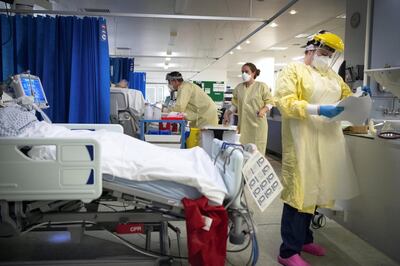One dose of the Oxford-AstraZeneca vaccine reduces the risk of death from Covid-19 by up to 80 per cent, data by Public Health England (PHE) revealed.
Another PHE study showed the Pfizer-BioNTech shot cut the risk of death by 97 per cent after two doses.
The findings show the significant effects vaccines have on reducing mortality and hospital admission, particularly in the elderly.
PHE examined symptomatic cases between December and April, and people who died within 28 days of a positive test.
People who had a single dose of the AstraZeneca drug were 55 per cent protected against death, 44 per cent for Pfizer, compared to unvaccinated people.
"Combined with the protection vaccines offer against becoming a case in the first place, this is equivalent to approximately 80 per cent protection against mortality in individuals vaccinated with a single dose of either vaccine," PHE said.
Protection against mortality from the Pfizer-BioNTech vaccine improved to 69 per cent for cases who had their second dose at least a week before they tested positive.
Combined with the estimated protection from getting Covid-19 to start with, this is equivalent to an estimated 97 per cent protection, PHE said.
The clinical results give a further boost to the UK's vaccination campaign, which has already delivered 53 million shots to more than 35 million people.
Health authorities in England are urging people to get immunised after the release of the PHE study.
Health Secretary Matt Hancock described the news as "life-changing".
"The evidence is clear that vaccines provide significant layers of protection against this awful disease," he said. "People across the country can breathe a sigh of relief knowing that their risk of becoming seriously ill or admitted to hospital with the virus is significantly reduced after being vaccinated.
"This news will be life-changing for many people who have worried about the devastating impact of this virus, either to themselves or a loved one.
"The vaccine is saving thousands of lives and giving us hope on our road to recovery. When the time comes to get your jab, please join the tens of millions of people who are now benefitting from this vital protection."
Meanwhile, Boris Johnson on Monday announced further unwinding of restrictions in England, including indoor service in restaurants and pubs, and the reopening of museums, theatres and cinemas.
The prime minister also announced that people in England can hug friends and family who don't live with them.
UK lockdown easing – what freedoms are restored on May 17?
If there is no surge in the virus before May 17, it is expected:
- Hugging between friends and family can take place
- People can meet in groups of up to 30 outdoors
- Six people or two households can meet indoors
- Overnight stays allowed with people not in your household or bubble
- Restaurants and other hospitality venues can seat customers indoors
- Up to 30 people can attend weddings and more than 30 can attend funerals
- Museums, theatres and cinemas can open
- Performances and large events can restart, with limits on audience numbers
- Hotels, hostels and B&Bs can reopen
- International trips will be allowed
- Exercise classes can restart











